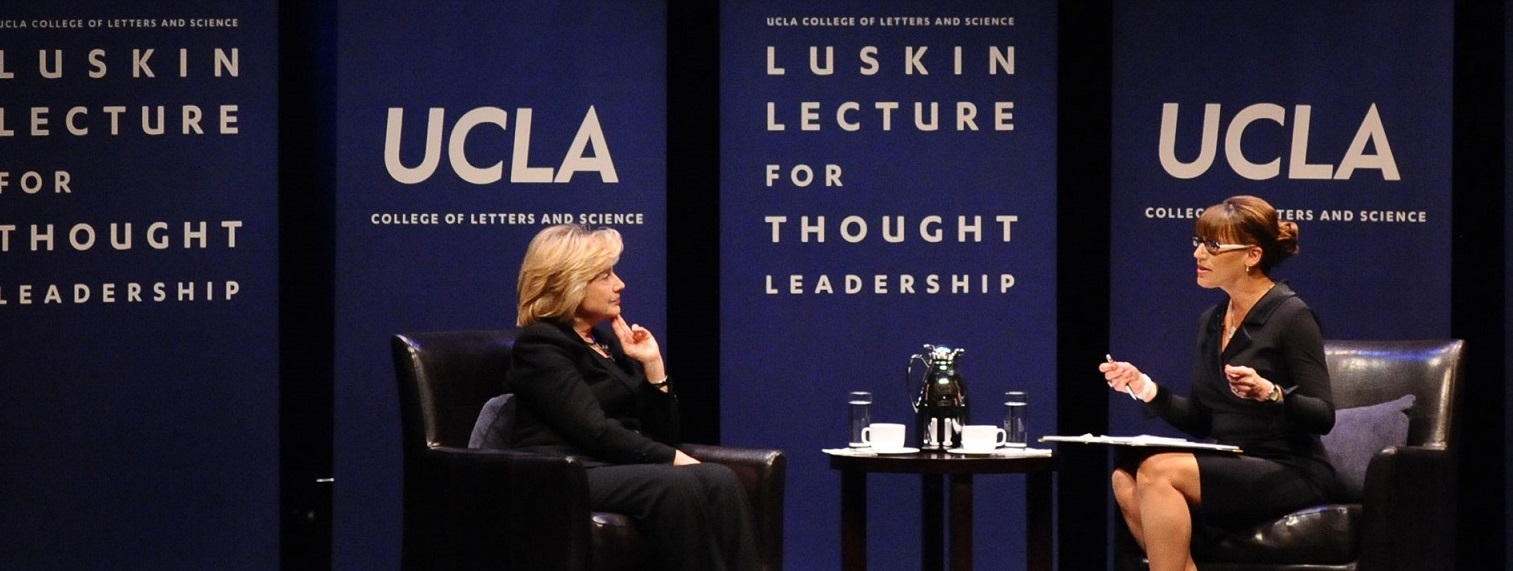
A device that translates brain signals into speech? It sounds like science fiction, but it was one of the University of California research breakthroughs that got the world’s attention in 2019.
把大脑信号转换成语言的设备?这听起来像科幻小说,但这是加利福尼亚大学在2019年获得世界关注的研究突破之一。
Research from across UC’s 10-campus system accounted for 14 of the top 100 most discussed findings in 2019.
2019年的100个热点发现来自加州大学10个分校的研究就占了14个。
Here’s a look back at a few of the UC stories that got the world’s notice:
以下是一些引起全世界关注的加州大学新闻:
Breakthrough device translates brain activity into speech
将大脑活动转化为语言的突破性设备

UC San Francisco announced in April that neuroscientists had created a state-of-the-art brain-machine interface that generated natural-sounding synthetic speech by using brain activity to control a virtual vocal tract — an anatomically detailed computer simulation including the lips, jaw, tongue and larynx.
今年4月,加州大学旧金山分校(UC San Francisco)宣布,神经科学家已经开发出一种最先进的脑机接口,通过大脑活动控制虚拟声道,生成听起来很自然的合成语音。虚拟声道是一种解剖学上详细的计算机模拟,包括嘴唇、下巴、舌头和喉。
The study was conducted in research participants with intact speech, but with further refinement, the technology could restore the voices of people who have lost the ability to speak due to paralysis and other forms of neurological damage, researchers reported.
研究人员称,这项研究的参与者拥有完整的语言能力,但经过进一步的完善,这项技术可以帮助恢复那些由于瘫痪和其他形式的神经损伤而失去说话能力的人的声音。
“For the first time, this study demonstrates that we can generate entire spoken sentences based on an individual’s brain activity,” said senior author Edward Chang, M.D., a professor of neurological surgery and member of the UCSF Weill Institute for Neuroscience. “This is an exhilarating proof of principle that with technology that is already within reach, we should be able to build a device that is clinically viable in patients with speech loss.”
“这项研究首次证明,我们可以根据一个人的大脑活动生成完整的口语句子,”资深作者、神经外科教授、加州大学旧金山分校威尔神经科学研究所(UCSF Weill Institute For Neuroscience)成员Edward Chang医学博士说。“这是一个振奋人心的原则证明,随着技术已经触手可及,我们应该能够建立一个在临床上对失语症患者可行的设备。”
Read more:
https://www.universityofcalifornia.edu/news/synthetic-speech-generated-brain-recordings
Widely used health care prediction algorithm biased against black people
广泛使用的医疗保健预测算法对黑人有偏见

UC Berkeley and University of Chicago researchers in October published a study finding significant racial bias in a category of algorithm that influences health care decisions for over a hundred million Americans.
去年10月,加州大学伯克利分校(UC Berkeley)和芝加哥大学(University of Chicago)的研究人员发表的一项研究发现,有一类算法存在严重的种族偏见,影响着超过1亿美国人的医疗决策。
The study found that a type of software program that determines who gets access to high-risk health care management programs routinely let healthier whites into the programs ahead of blacks who were less healthy. Eliminating bias in the algorithm could more than double the number of black patients automatically admitted to these programs, the study revealed.
研究发现,一种决定谁能获得高风险医疗管理项目的软件程序通常会让健康状况较好的白人比健康状况较差的黑人更早进入这些项目。研究显示,消除算法中的偏见可以使自动加入这些项目的黑人患者数量增加一倍以上。
“The algorithms encode racial bias by using health care costs to determine patient ‘risk,’ or who was mostly likely to benefit from care management programs,” said Ziad Obermeyer, acting associate professor of health policy and management at UC Berkeley. “Because of the structural inequalities in our health care system, blacks at a given level of health end up generating lower costs than whites. As a result, black patients were much sicker at a given level of the algorithm’s predicted risk.”
加州大学伯克利分校卫生政策与管理代理副教授Ziad Obermeyer说:“这些算法通过使用医疗成本来确定病人的‘风险’,或者谁最有可能从医疗管理项目中受益,从而对种族偏见进行编码。由于我们的医疗体系存在结构性的不平等,在一定健康水平上的黑人最终产生的医疗成本将低于白人。最终,在算法预测风险的给定水平上,黑人病人的病情要严重得多。”
Read more:
https://www.universityofcalifornia.edu/news/widely-used-health-care-prediction-algorithm-biased-against-black-people
Antarctica losing six times more ice mass annually now than 40 years ago
南极洲每年流失的冰量是40年前的6倍

Antarctica experienced a six-fold increase in yearly ice mass loss between 1979 and 2017, according to glaciologists from UC Irvine, NASA’s Jet Propulsion Laboratory and the Netherlands’ Utrecht University. Their study found that the accelerated melting caused global sea levels to rise more than half an inch during that time.
据加州大学欧文分校(UC Irvine)、美国宇航局(NASA)喷气推进实验室(Jet Propulsion Laboratory)和荷兰乌得勒支大学(Utrecht University)的冰川学家称,从1979年到2017年,南极洲每年的冰质量损失增加了6倍。他们的研究发现,在此期间,加速融化导致全球海平面上升超过半英寸。
“That’s just the tip of the iceberg, so to speak,” said Eric Rignot, chair of Earth system science at UC Irvine and the study’s lead author. “As the Antarctic ice sheet continues to melt away, we expect multi-meter sea level rise from Antarctica in the coming centuries.”
“可以说,这只是冰山一角,”加州大学欧文分校地球系统科学主席、该研究的第一作者Eric Rignot说。“随着南极冰盖继续融化,我们预计在未来几个世纪,南极洲海平面将上升几米。”
Read more:
https://news.uci.edu/2019/01/14/uci-jpl-study-antarctica-losing-six-times-more-ice-mass-annually-now-than-40-years-ago/
Kids these days: Why the youth of today (and yesterday) seem lacking
现在的孩子: 为什么现在的年轻人一代不如一代

Actually, the problem is with us, not them, reported UC Santa Barbara psychological scientist John Protzko. Grumbling about the younger generation is an age-old practice that transcends both culture and time. Protzko has termed the phenomenon the “kids these days effect.”
加州大学圣塔芭芭拉分校(UC Santa Barbara)的心理学家John Protzko说:事实上,问题出在我们身上,而不是他们。对年轻一代的抱怨是一种超越文化和时间的古老习俗。Protzko将这种现象称为“现在的孩子效应”。
“There is a psychological or mental trick that happens that makes it appear to each generation that the subsequent generations are objectively in decline, even though they’re not,” said Protzko, whose research appeared in the journal Science Advances. “And because it’s built into the way the mind works, each generation experiences it over and over again.”
Protzko的研究成果发表在《科学进展》(Science Advances)期刊上。他说:“每一代都有一种心理或心理上的错觉,让人觉得后代客观上在走下坡路,尽管事实并非如此。因为它是大脑固有的工作方式,每一代人都会一遍遍地经历它。”
“Humanity has been lodging the same complaints against ‘kids these days’ for at least 2,600 years,” said Protzko. “It’s the exact same complaints time after time — they’re disrespectful, they don’t listen to their elders and they don’t like to work.”
Protzko说:“人类对‘现在的孩子’提出同样的抱怨已经至少有2600年了。同样的抱怨一次又一次——他们不尊重长辈,不听长辈的话,也不喜欢工作。”
Read more:
https://www.universityofcalifornia.edu/news/kids-these-days-0
Bad diets now kill more people around the world than smoking
目前全世界死于不良饮食的人比死于吸烟的人还多

A team of scientists, including those at UC Riverside, tracked millions of deaths around the globe and found that poor eating habits kill more people than tobacco. In fact, poor diets are responsible for more deaths around the world than any other risk factor.
包括加州大学河滨分校(UC Riverside)在内的一组科学家追踪了全球数百万人的死亡情况,发现不良的饮食习惯比吸烟导致的死亡人数还要多。事实上,不良的饮食习惯是导致全球死亡人数最多的危险因素。
Researchers’ analysis found that 3 million deaths globally were attributed to too much sodium; another 3 million deaths were attributed to a lack of adequate whole grains; and 2 million more deaths were attributed to a lack of adequate fruit. Researchers found that countries where people eat a Mediterranean diet, which is high in both unsaturated fats and fiber, had the fewest diet-related deaths.
研究人员的分析发现,全球有300万人的死亡是由于摄入了过多的钠;另有300万人因缺乏足够的全谷物而死亡;还有200多万人死于缺乏足够的水果。研究人员发现,那些食用地中海饮食(不饱和脂肪和纤维含量都很高)的国家,与饮食相关的死亡人数最少。
“The results are based on limited data and assumptions, but conclusions are consistent with major reports from public health and medical authorities,” Marion Nestle, professor emerita of nutrition, food studies and public health at New York University, and a UC Berkeley alumnus, told The Washington Post. Nestle noted that the researchers seem to be recommending a largely, but not exclusively, plant-based diet, “and that’s what everybody is saying these days.”
纽约大学(New York University)营养、食品研究和公共卫生荣誉教授、加州大学伯克利分校(UC Berkeley)校友Marion Nestle在接受《华盛顿邮报》(The Washington Post)采访时表示:“研究结果基于有限的数据和假设,但结论与公共卫生和医疗当局的主要报告一致。”Nestle指出,研究人员似乎在很大程度上(但并非完全)推荐一种植物性饮食,“现在每个人都很认同。”
Read more:
https://www.washingtonpost.com/health/2019/04/05/bad-diets-kill-more-people-around-world-than-smoking-study-says/




